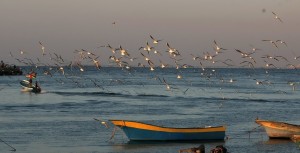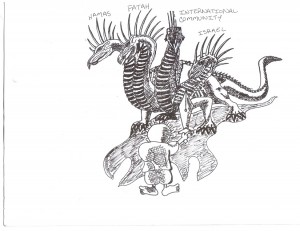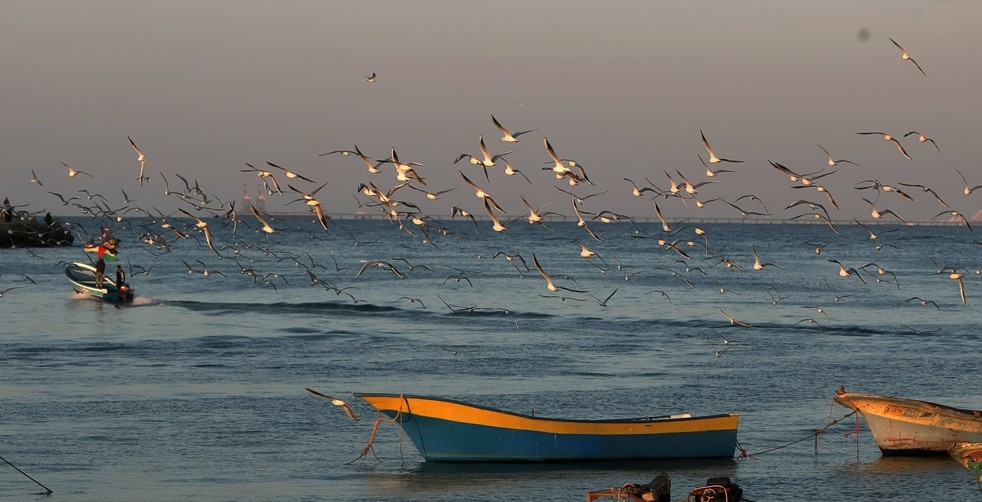
AFP Photo / Mahmud Hams
Ebaa Rezeq paused for a moment as the cappuccino machine hissed behind her in the Gaza cafe. She spoke to the bartender in Arabic, making sure he was finished before we started our interview. “Okay? Khalas hek? Temam?” she said to the barista. Turning back to her computer she said, “awesome. We can start.”
Ebaa lives, studies, and is politically active in the Gaza Strip. She is not a militant. She is not affiliated with either of the two largest parties, Hamas or Fatah. Neither is she an apologist for the Israeli occupation and the international complicity that keeps her hemmed in by the sea on one side and walls and gun turrets on the other.
She studies English and French literature at Al-Azhar University in Gaza. Outside the classroom she is a friend, daughter, sister, and uncompromising opponent of the Israeli siege, the duelling Palestinian governments, and the international community that stands by flaccidly.
“This is what makes the situation for us here as Palestinians harder than anywhere else,” said Ebaa. “Here you have your local authorities, and it is not only one government, it is two governments. Then you have the Israeli occupation. Then at the same time you have the siege imposed on Gaza. Sometimes it is really hard, even for us Palestinians to understand the reality of where we are living or how to deal with it.”
She wanted to point out the siege, but had trouble showing it. “You can’t touch it, you can’t see it. It’s not on the land but it’s surrounding you from everywhere else.
“It’s like you’re trapped in this teeny-tiny area and you can’t see your enemy and you can’t deal with it, but it’s controlling you from ‘up there.’ It’s like a movie you know? It’s really close to this Jim Carrey movie, The Truman Show.”
In 2005, in the last year of Ariel Sharon’s premiership, Israel pulled all their settlers and soldiers out of the Gaza Strip. But, Ebaa said, the perception of freedom is deceptive. “They tell you ‘you are free, you have the will to chose, you have the freedom to control your borders, to move in and out and so on,’ but it’s just a lie. It makes it even harder for you to survive the day.”
Battle number one: Ebaa versus Hamas and Fatah
Ebaa called Hamas and Fatah, the ruling political factions of Gaza and the West Bank respectively, the two dictators. “For me, personally, I think they are just two faces of the same coin; they’re no different.”
Despite this, Ebaa was part of a loosely knit coalition of activists, including Hamas and Fatah youth, that came together on 15 March 2011 to call for national unity.
While the protesters were in the Gaza streets, Hamas security infiltrated the group and beat many of them.
“That was a very wrong call from the youth movements to do that,” Ebaa said. “Why would you be calling for the freedoms of speech and expression and so on by bringing the two dictators back together?”
Since then it has become routine for youth activists to be harassed, and in the West Bank it is no different.
“The PA has tried different tactics in repressing any dissenting voices,” said Linah Alsaafin, also an uncompromising, independent, female activist in Palestine who just returned from a rare opportunity to visit her grandparents in Gaza. Linah lives in the West Bank where Fatah is in power. “[The PA/Fatah] has beaten up protesters twice in the summer who decried the scheduled visit of war criminal Shaul Mofaz [Kadima party chairman and former Defense Minister] to the PA headquarters in Ramallah.”
Linah said even during authorised protests, she can always spot mukhabarat, Palestinian intelligence officials, and policemen in plainclothes, lurking nearby. The mukhabarat keeps close tabs on the protesters, videoing them with their mobile phones.
“What Palestinians suffer from, especially the youth,” said Linah, “is the lack of a truly representative Palestinian body. The PA is known for its shameless collaboration with Israel and corrupt nature, and Hamas on the other hand has proven to be just as autocratic and suppressive when it comes to crushing dissenting voices.”
When Hamas gained full control of Gaza following their war with Fatah in 2007, they had a long list of Fatah-affiliated people who were banned from travel in and out of the area. Now that list has gotten longer.
The Gaza travel ban is increasingly applying to anyone who speaks out against the government, even if it is on Facebook. “It doesn’t include Fatah people only, but anyone who dares to defy the local authority in Gaza right now,” Ebaa said. “A lot of my friends are banned from travelling now, and are on that list. I will be trying to leave for a short while at the end of this month and hopefully I won’t be banned.”
At the same time, the Fatah dominated Palestinian Authority is using their international financing to impose what Ebaa called a “national strike” in Gaza. The PA pays Fatah supporters in Gaza to stay at home and not go to work, lest they be seen as collaborating with Hamas. Ebaa calls it blackmail. “If you don’t respect the Fatah government’s decision, you’ll be threatened and kicked out of your job.”
With their disgust directed at all political parties, I have often wondered why the ambitious youth movements in Palestine do not found their own political party.
“We have too many political parties,” answered Ebaa. “Especially the youth, they are fed up with the idea of political parties. I think founding a new one is not a solution. Fatah, when they were in power, we thought that they were the problem and that they’re selling us out. But then Hamas came in power and it’s getting worse, they’re falling in the trap Fatah was in before. So, no. No for political factions.”
I posed the same question to Hania Mansour, a young female lawyer in Egypt who is also a member of the 6 April Youth Movement, which is politically active but has yet to run a candidate in elections. “As a movement we have many things to do now, before becoming a political party,” said Hania. “The revolution is not finished and there is not a good political system.” Her and her group demonstrated this ethic last week in the lead-up to the constitutional referendum. Instead of marching, like many others did under the banners of their political parties, 6 April went door-to-door to discuss the constitution.
“I think the people are now going toward being independent and giving up on their political affiliations,” said Ebaa. “I think the independent people in Palestine, their numbers are getting bigger and bigger. It’s for the better in Palestine.”
Battle number two: Ebaa versus the world
Ebaa also blames the international community for supporting the political division within Gaza and supporting the Israeli occupation.
“The international community is not helping that much. They give money to the PA for example in the West Bank, but giving this money to the PA, they’re feeding this division and supporting the Palestinian fragmentation.”
Ebaa said the PA uses international money to help finance their national strike strategy in Gaza. “I don’t think this is ethical or moral on behalf of the international community. This is the international community supporting Fatah in their conflict with Hamas.”

Ebaa said she believed the international community is aware this is taking place and they have no problem with it. She says that the United States and European Union could pressure the PA to stop this by threatening to cut off financing. “They know that they can use this tool. They used it when Abbas went for the UN bid. They blackmailed the Palestinians and said, ‘if you do that stuff, you’ll no longer receive our money.’ Since they can use it, they better use it for our own good.”
These accusations are not just the hyperbole of a young activist. I spoke with Dr Mohammed Ibrahim Migdad who is the vice-president for research at the Islamic University of Gaza. “Ramallah receives donations from different countries to pay all their employees, some are working and others are not working, especially those who are in Gaza,” he said.
Migdad agreed that the US and EU are aware of what is going on with the PA’s finances and believes foreign governments see the division of the Palestinian government as a better alternative than Hamas rule.
Ebaa is sick of the Palestinians being treated as pawns in global strategies instead of being put first in aid decisions. This disregard for the Palestinians was most apparent when democratic elections were widely undermined by the international community after Gazans elected a Hamas majority.
“When the people chose Hamas before, everyone stood against us, everyone stood against the free will and the free choice of the people of Gaza. Everyone boycotted Hamas, everyone imposed this collective punishment on the whole population of the Gaza Strip.” Ebaa was talking about the Israeli blockade on Gaza in response to Hamas’ election.
“Everyone knows that after Hamas won in 2006 the international community refused to deal with the new government of Hamas,” said Migdad. “They refused to deal diplomatically and they refused to offer any donations. Also, this new [Hamas-led] government in 2006 faced the problem of closure. All countries closed down the area and put a siege on Gaza.”
Although this siege was directed at the government of Gaza, Migdad said the government did not suffer most. “It is against the population in Gaza. The people are the ones who face the siege. It’s not Hamas government or the Hamas movement.”
Ebaa said, “what is going on here is inhumane and it is unacceptable. At the same time the UN issued a statement that said the siege is actually legal.”
Last year’s Palmer Report that examined the events surrounding the Israeli military’s killing of Turkish activists on an aid flotilla to Gaza. The report differentiates between the land and naval siege, but unequivocally found the naval siege legal, writing, “the panel is not persuaded that the naval blockade was a disproportionate measure for Israel to have taken in response to the threat it faced.”
“The international community is making the situation very bad in these two directions, when it comes to Israel and the occupation and when it comes to the internal conflict of Hamas and Fatah,” Ebaa said. “In both ways they’re not really helping, they’re not trying to change the situation or improve it. They’re trying to maintain the status quo, or at least that is how it seems to us here.”
Battle number three: Ebaa versus Israel
I spoke with Hilik Bar, the secretary general of Israel’s Labour Party, at the party’s low-key headquarters on the ground floor of a Tel Aviv residential bloc. The Labour Party is billed as the centre-left of Israeli politics, though Bar preferred to present his party as the popular, reasonable, and humane centre of a bickering political spectrum.
In fact, Bar said, the main difference between his party and Meretz, a more leftist party, was less about policy than it was about decorum. He said that while Labour agreed that settlers should be pulled back to the 1967 borders, he did not think Meretz should villainise those settlers. Bar emphasised that settlers are legitimate citizens of Israeli who deserve the respect of Israeli political parties.
Bar stated that Labour is more than prepared to retreat behind the 1967 borders in exchange for peace with a Palestinian state that recognises Israel and renounces violence. He added that a few settlements would stay. He declined to be more specific, but when I brought up Ma’ale Adummim and Ari’el, he acknowledged that those two would be staying with Israel.
Ebaa has never been to Jerusalem/Al-Quds, her capital, where Bar is the sitting minister of tourism. But she has friends in the West Bank and she is more than a little aware of Ma’ale Adummim and Ari’el; “they have thousands of settlers there.” Over 53,000 according to Israeli numbers.
“He says this as if it is a generous offer, or as if it is moderate, or as if we have to thank him for it. But no. Based on international law, all settlements are illegal.”
Ebaa said this appendix to Bar’s offer of statehood makes it insincere. “He can’t possibly be endorsing a Palestinian state based on the ’67 borders because these settlements are built on the ’67 borders and are a part of the Palestinian state he is pretending to support in the future. No thank you, this is not generous,” she thought for a moment before adding, “or legal.”
When I asked the Labour secretary general about his country’s shut out of Hamas after their electoral victory, Bar shook his head and clarified that Israel recognised the Hamas victory, but simply refused to deal with Hamas politically.
“It’s not true,” said Ebaa, herself a bitter Hamas opponent. “After Hams won the election, Israel arrested a third of the Palestinian legislatures. Twenty two PLC members are still in Israeli jails under administrative detention. That means that they’re being held without charge or trial.”
Ebaa said Israel, along with the international community, supported a coup by Fatah against Hamas. When Hamas managed to hold on to control of the Gaza Strip, Hamas agreed to ceasefires but, “Israel never stopped their ground incursions, navy violations, air raids, assassinations and arrests.
It’s not me talking, you can check their jails; there are a lot of Hamas members there for nothing but for their political affiliation. For me and for the Palestinians this is not respect or recognition of the Hamas victory. I cannot see any reason for Israel to continue fighting with Hamas as Hamas government did recognise the ’67 border, and that means recognising Israel by default, right?”
Finally we spoke of the right of return. The right of return has become almost an afterthought in international discussions of a two-state solution. No Israeli I have ever talked to, even Israelis that attest to being radical leftists or peace advocates, thinks that the right of return is possible. On this account Bar and Ebaa both agreed with me.
Ebaa said in response to this stance she would say, “‘Thank you, because you are emphasising our point of view here.’ They refuse to stand by the UN resolution that endorsed the right of return. Every international law guarantees the right of return. They are stating this in public and no one objects to that. So actually I do not care what political parties say, because eventually, the right of return is the core of the Palestinian cause. It is the main issue in our struggle. Without implementing the UN resolution, there is no solution whatsoever to this ongoing struggle of more than 60 years.”
***
Ebaa is in many ways the voice of a new generation in the Middle East. A generation which is happy to, and capable of, redefining the paradigm of dissent in the region.
It is relevant that she is young and politically independent. But she is also female. It is not breaking news that the region has a horrid track record regarding women’s rights, but being the victim of oppression should not be mistaken for weakness. Young activists like Ebaa are aware of the patriarchy that surrounds them and are doing more to confront it than any of the woeful western voices will ever manage.
Not only is Ebaa an independent voice, but she is a voice speaking on behalf of independence. When asked what she would say if she had an opportunity to address the international community, she offered this: “They can just respect the people’s choice, and actually defer to the people to solve their own problems. We’re addressing our leaders, the international community, and everyone in the world. It’s time to listen to the Palestinian people and their demands.”


